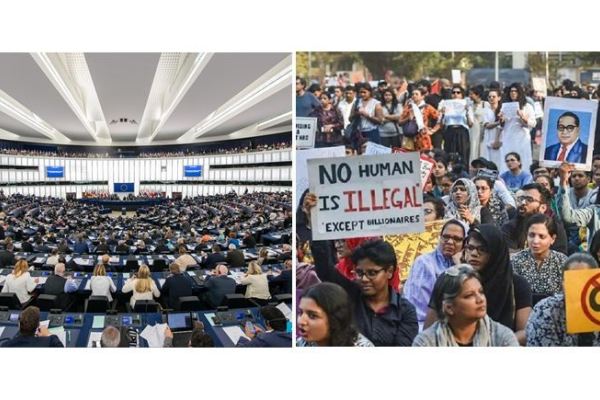Brussels – News Time
The European Parliament on Wednesday strongly condemned the resolutions presented by six parliamentary groups against the amendment of the citizenship law in India. These resolutions were presented in the European Parliament by 4 major parliamentary groups, including the European People’s Party and the Social Democrats Party. In addition to the Indian Citizenship Amendment Act (CAA), the issue of Kashmir has been mentioned. Before the debate on these resolutions began, there was a motion in the House concerning whether or not to vote on those resolutions. After that, voting on resolutions has been postponed until March.
Member of Parliament from the UK, Shafaq Mohammad, who was also the trigger of the resolution, said that it was argued in favor of delaying the Indian citizenship law by March. That India’s Supreme Court has filed petitions against the CAA and the European Parliament should not vote on these resolutions until the Supreme Court decides. Inside the House, strong sentiments were expressed against the CAA, and opponents of the CAA called for a Nazi visit to the newly adopted laws in India. He said the CAA was only targeting Muslims and trying to get them stateless or homeless.
John Howard, a member of the Social Democrat group, said he considered the CAA very dangerous and a discriminatory law. He said that this is separating the Muslims from the target. During the debate, several members also spoke in favor of India and said that India is the largest democracy in the world. And the EU wants to strengthen and strengthen its relations with it. Some members said that the concerns expressed about the CAA were not correct. He said that India is a sovereign country and has full authority and right to collect the data of its citizens. They have not even attempted to dispel the notion that this law is targeting people of a particular religion.
Speaking on the resolution, Helena Dalli, Vice President of the European Commission’s Deputy Speech, spoke. That the European Union values the human rights of the world at large and builds its relations on a global basis. He said that the European Union wants to further strengthen its relations with India, which should be based on human, and minorities and democratic values. He said Joseph H. Bural, Vice President of the European Commission and Head of Foreign Affairs, expressed his concerns over CAA law in his talks with Indian officials earlier this month and hoped that Had expressed that India will take positive steps in this regard.
He also expressed his hope that the Supreme Court of India would not ignore global human rights on petitions filed against the law. Resolutions of this kind adopted in the European Parliament consisting of 751 elected representatives from 28 EU member states are not required for the European Commission to implement, but the political and diplomatic level of symbolism is crucial to the presentation of humanitarian and minority rights resolutions in a global organization against the world’s largest democratic and secular country.
In India, the Bharatiya Janata Party government has expressed strong resentment over these resolutions of the European Parliament. Prime Minister Narendra Modi’s government has taken a strong stand in this regard and a spokesperson for the Lok Sabha in India has written to the European Commission protesting in writing. The European Commission has expressed its dissatisfaction with these resolutions and has taken the view that these resolutions have been presented by the members of parliament in their private capacity. EU member Shafaq Mohammad, speaking to the BBC after the meeting, said that there was strong and vigorous lobbying at the diplomatic level to delay these resolutions.
European Parliament members cite international human rights and India’s constitution, and Article 14 of the constitution in particular that the modification of the citizenship law by the present Government of India does not conform to India’s own Constitution, apart from the internationally defined human and minority rights, which are founded on democratic and secular grounds. In these resolutions, the Indian government has been demanded to review the amendment. In addition, the resolution also expressed concern over suppressing peaceful protesters’ protests by exercising their democratic rights against the CAA. And more than two dozen deaths in particular have been mentioned.
Among other points in the text of a resolution, Kashmir is mentioned and the EU member states are emphasized that they play a role in ensuring the implementation of UN resolutions to resolve this conflict in the context of Kashmir, India and Pakistan have been asked to consider the potential for unintended human, social and economic benefits associated with the resolution of the conflict. The Modi government has strongly condemned India’s decision to change the constitutional status of Kashmir in India as one-sided.
European Commission and EU member states have been asked to talk with the current Indian government on amending citizenship laws in their relations and urge it to comply with its obligations to minorities under international laws and principles. The resolutions express the hope that the Supreme Court of India, in deciding the petitions filed with the CAA, International human rights will consider the rights of minorities in the Constitution provided in the Indian Constitution.




